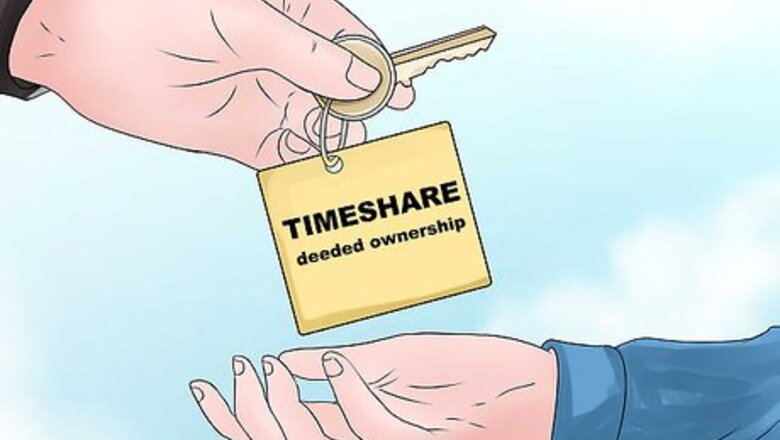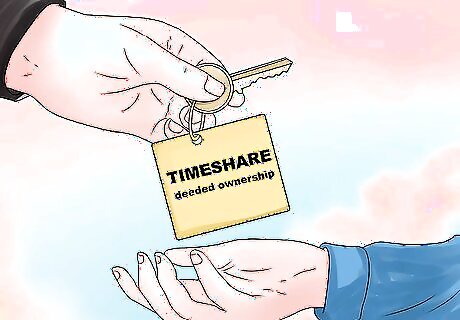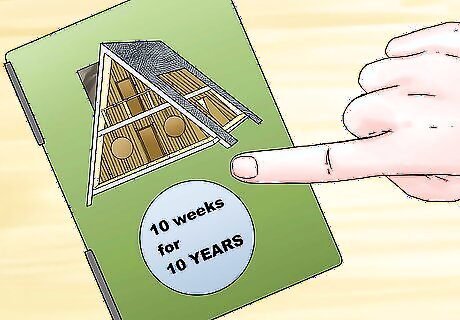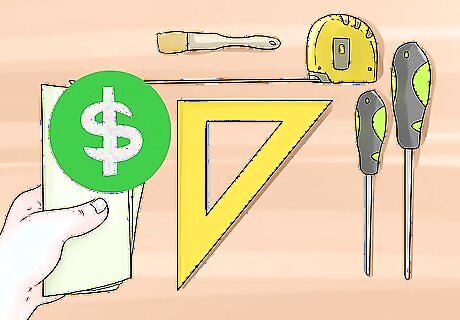
views
Picking the Right Options for Your Lifestyle

Choose deeded ownership to own part of the unit. With this type of timeshare, you buy a certain time period each year in the vacation unit. You are actually part owner of the property, so you can rent it or even include it in your will to pass on to someone else. The downside is you can only use the unit at the specified time each year, unless you are able to trade with another timeshare holder.

Pick the "right-to-use" option for more flexibility. In this case, you buy a certain amount of time in a unit, such as the right to use it for 10 weeks a year for 10 years. You don't own the property (the resort does), but you do own the interest in the property. This type of timeshare can be set up in a few ways. You might buy a specific time period each year, or you may buy the right to a certain amount of time each year. You might also buy points that can be exchanged for staying at different resorts withing a group of resorts. Generally, this type of timeshare is specified for a certain number of years. While flexible options are nice, you still need to plan ahead, as rooms fill up quickly.

Pick between new and "used." When it comes to timeshares, "used" refers to buying a timeshare from another buyer, rather than from the resort. "New" refers to buying directly from the resort. Buying new is more expensive, but you're less likely to get scammed. Plus, you know the title is clean without any liens on it. A lien is when a creditor has the right to sell the property if the payment is not met; often, an owner doesn't have the right to sell a property with a lien on it without first talking to the creditor. You may also get added benefits, such as being able to trade dates. Buying used can be much cheaper, as some people are desperate to unload their timeshares. You may even find timeshares as cheap as $1 USD. These deals may be perfectly above board, but you do need to do your homework first.

Don't buy a timeshare as an investment. Timeshares are not good as an investment option because they generally depreciate in value. If you're looking for a real estate investment, it's best to pick another option.
Choosing and Evaluating a Timeshare

Choose a location. The first step in buying a timeshare is to pick a place you'd like to vacation most years. While some timeshares offer a point system where you can visit more than one location, most of the time, you'll be returning to the same place each year. Therefore, you need to pick somewhere that you enjoy going. Of course, certain vacation spots will have more timeshares than other places, so you'll need to pick a place where you can find a timeshare. Some popular timeshare in the US locations include Hawaii, Vail, CO, Aspen, CO, Florida Keys, and Lake Tahoe, CA.

Pick a reputable company to buy from. Whether your buying new or used, choose a company with a good reputation. it's important to visit the resort and view the property, as well as talk to other timeshare owners if possible. You can also look for complaints about the company online. If you're buying used, pick a site such as https://tug2.com/timeshare-marketplace.aspx or http://www.myresortnetwork.com/sell-timeshare/.

Rent first. If you can manage it, try renting from the property first. Staying for a week gives you a better idea of what the company is like than just visiting. Plus, it helps you decide if you really like the location.

Ask about maintenance. It's good to know ahead of time what the company's policy is on maintenance. For instance, you should know how quickly you can expect repairs to be carried out. It's also a good idea to ask about the average cost of maintenance fees per year. Ask for a written copy of the maintenance policy. That way, you have something to refer to, as well as a document to use if you need to turn to legal recourse.

Have a lawyer look over the contract. If you don't know much about real estate contracts, it's a good idea to have someone who is knowledgeable look over your contract. That way, you can sign it with confidence that you're not getting scammed.

Have a title search performed if you're buying used. If you're buying a used timeshare, it's important to make sure it's above board. Hire a title search company to perform a title search on the timeshare, which can tell you if the title has old liens and will assure if the owner actually is the person you're buying from.
Paying for Your Timeshare

Pay cash if possible. The interest rates for a timeshare are typically pretty high, often 12 to 18 percent. If you buy it with a loan, you'll end up paying a lot more than you would if you just paid cash. Plus, if you ever want to sell it, it can be difficult to get a buyer to pay enough to cover the loan.

Pay your maintenance fees. When it comes to buying a timeshare, the initial price isn't all you need to worry about. You'll be responsible for annual maintenance fees, which can run as much as $1,000 USD or more. Also, you may be hit with "assessment" fees some years, which can run in the thousands.

Back out if you have buyer's remorse. Because buying a timeshare is often done on impulse, many states give you a week or so to take the offer back. In fact, Florida gives you a week and a half. If you're having second thoughts, see if you can rescind the contract where you are. If you want to rescind, send the request in writing by certified mail, so you can guarantee the company received it.

















Comments
0 comment